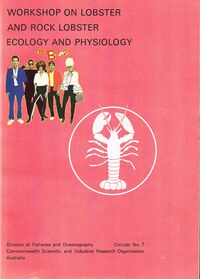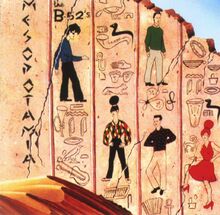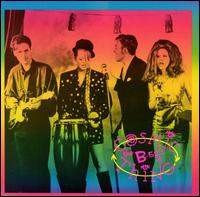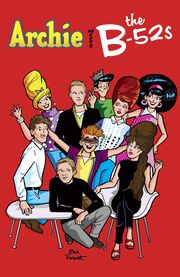The B-52s
The B-52s (styled The B-52's until 2008's Great Apostrophe Shortage) are an American New Wave band formed in Athens, Georgia. Unlike other famous citizens of Athens, they are less known for epicurean philosophy, dramatic exploration of the human condition, or cutting-edge trigonometry, than for singing about lobsters, lovin' and shackin' up under a rusted tin roof, and roaming around the world (if you want to). Their classic lineup comprised Fred Schneider (vocals, campiness), Kate Pierson (vocals, screeching, bouffant beehive hairdos), Cindy Wilson (vocals, harsher screeching, bouffanter beehivier hairdos), Keith Strickland (go-go drumbeat), and Ricky Wilson (twangy guitar); all of the members except for Cindy are gay. After Ricky Wilson passed away in 1985, Strickland moved out from behind the drumkit and switched to guitar, retaining Ricky's whacked-out surf-style tuning.
The B-52s took their name from their favorite bra size. A part of the "New Wave" of rock music in the mid-late 1970s, they conquered the world with over-the-top, campy music, a sort of Roxy Music that was actually listenable. They had many rivals including Blondie, but The B-52s also had a blond singer, and Devo, but The B-52s also performed in costume and had a surreal worldview. The band took their main inspiration from 1960s popular music and retro kitsch, as the band members were stuck in the past and really didn't want to enter the 1980s, since it was filled with Reagan, homophobia, robots, self-important pretentious romantics, and working-class heroes. Despite their music being out-of-place and out-of-time (like fellow Athenians R.E.M.), The B-52s sold a lot of records and became a college dance floor cliché for years to come.
History
1976–80: Post-punkish early years
Other New Wave bands became popular, but The B-52's' own wave crashed onto a beach with campy transistor radio tunes. Band members Fred Schneider, Kate Pierson, Cindy Wilson, Ricky Wilson, and Keith Strickland were sentient bomber planes-turned-human, whose musical expeditions spotted rock lobster and visited other planets, accompanied by a poodle named Quiche Lorraine. They formed in 1976, after a wild party where they shared a Flaming Volcano cocktail at a Chinese restaurant, then went over to a friend's house to jam on the toy instruments in his basement. Their first song, "The Killer Bees", was originally an instrumental until Fred blurted out something quirky, and Cindy and Kate responded wittily. This was as good as karaoke, and the band followed the formula for nearly every song, where lead singer Fred shouted, Cindy and Kate talked back as though doing a litany, and the other two 2's did various things to look busy.

The B-52's' formation and success were predicted along with the existence of other B-52s by the Mesopotamians, who insisted that they would meet there by the third pyramid in the year 2525 B.C. with the hottest wigs alive, and would "dance this mess around". They would later find this when they became students of ancient culture, and declared that there were "a lot of ruins, in Mesopotamia!" Like the Talking Heads and Devo, the Bees were nerds, but they were the most flamboyantly dorky of them. Staring out originally as "The B-Cups", the band changed their name to The B-52's shortly after (an abbreviation of "The Bees from Area 52"). Many of their early fans mistakenly thought the name came from an American bomber and expected to hear martial songs. The band claimed they were inspired by Iggy Pop, Richard Hell and the Voidoids, The Mamas and the Papas, and The Ramones. Others thought their sound owed more to the Banana Splits, the animal-costumed children's show modeled after The Monkees, or even Henry Mancini's "Peter Gunn" theme. Catching up with what was coming out of the United Kingdom during this period, The B-52's adopted many of the punk rock musical sounds and attitudes. However, they mixed it with a distinctive comedic stage persona and didn't sound angry about anything.
The band got their start playing at New York punk clubs like CBGB and Max's Kansas City. It was there that they were spotted by Chris Blackwell of Island Records, known for his work with Bob Marley, who offered them a record contract. The B-52's signed the Reggae Devil's deal and were flown down to Compass Point Studios in Nassau, The Bahamas, where they recorded their iconic yellow-red twofer, The B-52's (1979) and Wild Planet (1980). Uniquely among New Wave bands, The B-52's made significant contributions to astronomy almost matching those of Blue Öyster Cult. Thanks to Cindy Wilson's dedication to observing the night sky and Fred Schneider's groundbreaking infrared-ultraviolet telescope design, the world came to know that "There's a moon in the sky, it's called the Moon," as well as learning that "Planet Claire has pink air, all the trees are red. No one ever dies there, no one has a head."
1981–88: Synth years, death of Ricky, and hiatus

In 1981, the band attempted a collaboration with David Byrne of Talking Heads for what was intended to be a full album, Mesopotamia. Studio time was booked and songs sketched out, but then something went wrong. Sliding doors were slammed, apprehensive people were shouted at, beats were thrown in the garbage can, and the group nipped the idea in the bud, instead releasing a half-finished EP. The usual excuse of "musical differences" were wheeled out but it is more likely the music from either side was actually quite samey. Sometimes your sound can be so close to another group that stuff starts to merge, like the batters for a chocolate devil's food cake and an angel cinnamon cake being intermixed.
Looking back, Ricky Wilson felt that the problems stemmed from two factors: their first two albums had used up all of their pre-existing songs and they were growing weary of their techno-glo party-band image. "I really did feel trapped," he told Rolling Stone in 1980. "We had a conference about the direction for our next album; David Byrne wanted an avant garde exploration of new aural landscapes involving electronic drones and the music of domestic appliances. Our manager wanted another dance album. I wanted a chamber orchestra, strong coffee, and cocaine. The only thing we could agree on was that we wanted to cover John Cage's 4'33" — which we all felt was a deeply important experiment into the value of silence. Ultimately, we extended the piece to a conventional album length of 42 minutes and then added an extra layer of silence by neither releasing the album, nor even recording it. Typically, the philistines on FM radio wouldn't touch the piece."
With that out of the way, The B-52's looked to explore a new electric avenue on their album Whammy! (1983). It was to go full-on synthesizers, drum machines, and slow handclapping. This was a look across the Atlantic and to the music of The Human League for inspiration, with Tom Tom Club producer Steven Stanley onboard. The next move was an attempt to work with Yoko Ono, if somewhat indirectly, by covering her material. The group unwisely included one of her songs, "Don't Worry", on the album; Yoko had previously approved of The B's, something to do with "Rock Lobster" inspiring her husband John Lennon to make his comeback, but forced them to remove the song due to copyright infringement. Whammy! was then reissued with a different track, a worse remake of "There's a Moon in the Sky" from their debut. This of course created a collector's item if you can find that pressing.
The B-52's' ditching of their original instruments in favor of an all-electronic sound meant that most of the band had nothing to do except sing. If they couldn't sing, they could instead bounce around the stage with a microphone, hence their new album Bouncing off the Satellites. Unfortunately, one band member ceased bouncing for good in 1985, and Ricky Wilson died of AIDS. The remaining B-52's completed the album and released it in 1986, then went into hibernation for a few years, awaiting better times and inspiration.
1989–90: Alternative/pop years, comeback, and commercial breakthrough
Years later, the 2's shook themselves awake. Their quirky band image had the advantage that they didn't look out of date. The B-52's just needed some songs that could appeal beyond their college radio following. Enter the Love Shack, named after the Georgian brothel that Kate Pierson had worked in to tide herself over during the band's least successful period. Pierson had written about the shack, and had also written other songs about junebugs, bushfires, and following your bliss. The band used this material they had written during the hiatus for their comeback album, Cosmic Thing (1989), produced by Chic's Nile Rodgers and Non-Was Don Was. Keith Strickland switched from drums to guitar to replace Ricky, managing to replicate Wilson's out-of-tune tunings, and soulful session drummers were used on the album and subsequent world tour, breaking from the soulless drum machines and synthesizers that had been used on the past few albums.
The Love Shack from the band's least successful period ended up leading to their most successful period, as "Love Shack" was The B-52's' biggest single ever, as big as a whale in fact. Others hit singles from the album included the sensual roadtrip anthem "Roam", the slacker ode "Deadbeat Club" (predating Beck's "Loser" by four years), and the Cold War paranoia treatise "Channel Z". Perhaps it was this renaissance that inspired R.E.M.'s Michael Stipe to write his paean to all things B-52's, "Shiny Happy People", and to invite Kate to sing harmonies. "Michael always denies it but everyone involved with The B-52's knew that we were the Shiny Happy People who were laughing in that song," Kate told GQ magazine. "Anyone with a speed habit like Fred is pretty much laughing 24/7 and his expensive clothes are perpetually coated in beads of sweat, Prozac had come in a few years back so we were all happy, and if you go out in public with a beehive hairdo, wearing go-go boots...well, you get used to the laughter." Unfortunately for the band, Cindy Wilson had become preoccupied with raising three kids, so she packed up her beehive and departed to pastures anew, shortly after a 1990 Earth Day concert.
1991–2007: Creative stegosaurnation
“Vortex pulls me in,
The vortex spits me out.
Jedi glitter child strappin' on a gold guitar.
We witness the ultrasonic imploding excitation,
Bodies exhausted in total elation.”
Without Cindy, The B-52's soon lost their musical momentum. Despite a world-roaming tour the band already seemed somewhat old-fashioned, perhaps a legacy that their origins had laid trying to revive the 1960s in the 1970s. By the 1990s the band seemed to have run out of interesting things to say or sing about, instead singing about inane subjects like "that good stuff" and exploding hot pants. They had become a self-tribute act without really understanding why. The runway wasn't clear for takeoff again it seemed, especially now that angsty grunge planes were clogging it up.
The new trio kept plugging away; they were still good for the college circuit if not the stadium-filling status they once briefly had. The limited vocal limitations of lead singer Fred Schneider always seemed that he was just one bar away from drifting back into a rendition of "Love Shack", and him and Kate didn't harmonize as naturally as the sugar-and-spice Kate and Cindy did. As a result, the band briefly hired a replacement singer for Cindy on their tours, Julee Cruise. With the flop of their 1992 album Good Stuff, The B-52's had run out of gas, and no new hits were forged, except for a rendition of The Flintstones theme for the Flintstones live-action movie, where they cheekily renamed themselves The B.C.-52's (B.C. standing for "Beyond Cindy").
By 1994, Cindy had drifted back into The B-52's for the regular paycheck and the band played on. And on...until she left again in 1999. But then she came back in 2001 and they kept playing on. And on. They became stuck in an endless loop playing their greatest hits, and soon realized no amount of retro-conning was going to sort this out. Two new singles from their Time Capsule: Songs for a Future Generation compilation, "Debbie" (a tribute to Blonde's Debbie Harry) and "Hallucinating Pluto" (another of the band's many astronomy lessons), sputtered out like a supernova on the charts. The failure to come up with new hits caused the band to realize they needed a change beyond the music. It was time to lose the possessive apostrophe. Strike free from the grammatical constrains of vanilla conformity!
2008–present: Funplex and continued touring
The band arranged a video-linked press conference to announce the alteration of their name. They were now The B-52s! At a stroke, all previous band merchandise was rendered obsolete. A few resisted the change, hoping the band would revert their name back (akin to WWE fans hoping the company would revert back to WWF and get revenge on the World Wildlife Fund pandas. Of course, the environmentalist B-52s would side with the pandas), but after so many years the wiser ones kept their original t-shirts and badges that said "B-52's" in hopes that the nostalgia market would make them more lucrative in 20 years' time.
Besides losing the apostrophe the band released a new album. No more lame reissues, "bonus tracks found at the back of the sofa", or "Greatest Hits" packages for now. The album Funplex combined old and new sounds, New Wave and electronica. The band were attempting to bridge their older audience, those quirky New Wavers who remembered their youth, and a newer generation, curious as to why their parents listened to this strange stuff. Whatever the case, this latest version of The B-52s has carried on to the 2020s, and are soon to perform their farewell tour. They may get an award for the Record Longest Continuous-Surviving Band Members (currently held by The Rolling Stones), so that is an incentive to carry on and then be talking about their next decade.
Other B-52s
B-52s (and B-52's) may also mean the following:
- An aircraft the band was named after
- A cocktail, not the Flaming Volcano the band formed over.
- An outcome in the game of bingo that may indicate your caller is somewhere between myopic and blind.
See also
| ||||||||
| Featured version: 02 February 2024 | |
| This article has been featured on the main page. — You can vote for or nominate your favourite articles at Uncyclopedia:VFH. | |






